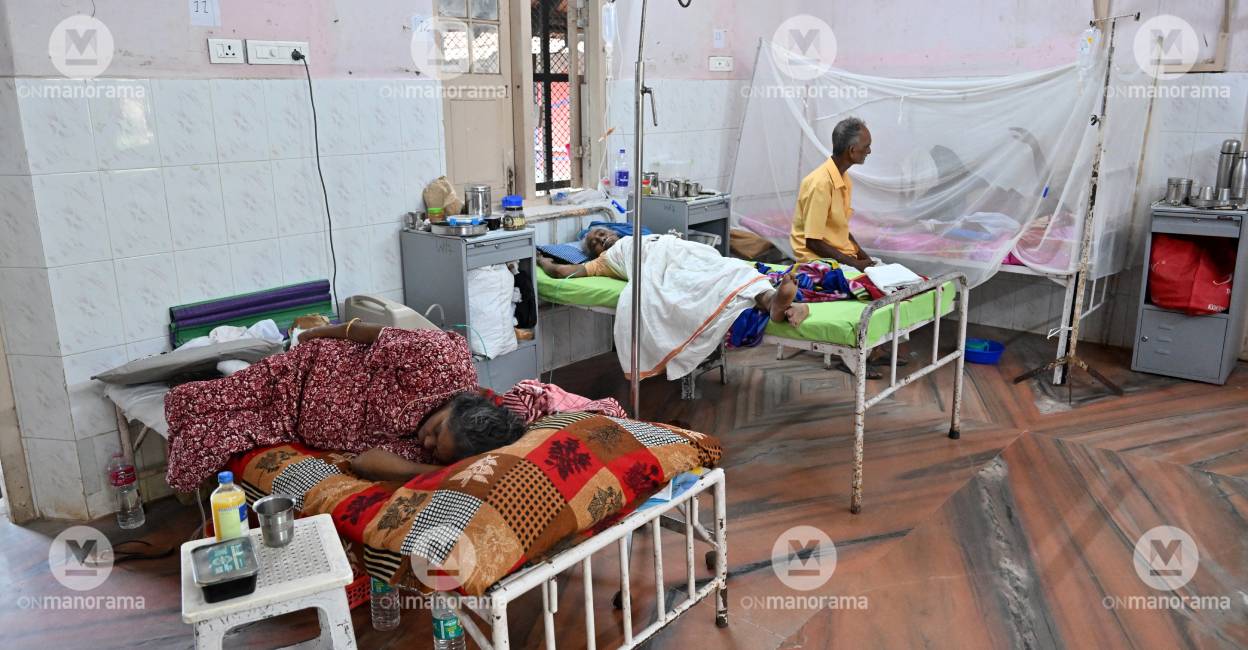Are fevers caused by sanitation failure? Ministers, opposition leader cross swords

Mail This Article
Thiruvananthapuram: Health Minister Veena George said in the Assembly on Tuesday that the fever situation in Kerala was fully under control. Opposition leader V D Satheesan, on his part, said the state had become a land prone to all the infectious diseases in the world.
As proof of her contention, the minister said that the total number of fever cases in the first six months this year was 12.02 lakh, which is over a lakh cases lower than the 13.1 lakh in the first six months of 2015, before the first Pinarayi ministry came to power.
Read More: Jaundice, not dengue, second infectious cause of death in Kerala now
There are no more Zika cases, she said. George said that Kerala made sure that not a single person contracted Monkey Pox from the index patient who returned from the UAE in 2022. She said that Kerala had reduced the Nipah fatality rate to 33 per cent while the global average hovers around 80 per cent. She also said that the dengue fatality rate had come down to 0.25 per cent in 2024 from 0.34 per cent in 2015, UDF period.
"The primary focus of any public health authority is to reduce fatalities and we are doing just that," George said while arguing against suspending the House to discuss the fever issue. The adjournment motion on the issue was moved by Muslim League MLA T V Ibrahim.
Kerala model hazard
Satheesan had another set of figures to prove the minister wrong. He pulled it from the latest report of the Ministry of Statistics and Programme Implementation. The report is about the nine diseases that are closely linked to inadequate sanitation and hazardous environments.
According to the report, it was in Kerala that the highest number of dengue cases was reported in India in 2023 (9,770 cases and 37 deaths).

"This shows that Kerala has the worst sanitation situation and the most hazardous environment in the country," Satheesan said. The Opposition Leader said that never before had the pre-monsoon cleaning drive been such an utter failure. "Can anyone step out of their homes if it rains overnight in this capital city," he said. "There are pockets in the capital city that remained flooded for 10 days even after the rains subsided," Satheesan said.
He said that he had personally called up the district collector and corporation secretary when he was flooded with panic calls. "Not a single person paid heed," the Opposition Leader said. "It was the failure to carry out the pre-monsoon sanitation drive that had caused rainwater to accumulate and stagnate, and then gradually seep into homes and eventually contaminate drinking water sources," Satheesan said.
Model code of excuse
Minister for local bodies intervened at this point to argue that the pre-monsoon drive was held up by the election model code of conduct.
"The model code of conduct prohibits ministers and also MLAs from calling meetings to discuss sanitation drives," Rajesh said. "The bar is only for ministers and MLAs, not for your officials," Satheesan shot back.
"You could have given directions to your officials to carry out the necessary pre-monsoon tasks. Moreover, the work should have been done as early as March and should not have waited for the monsoon to arrive. I don't know of any model code of conduct in place during March," he said.
DLF tragedy
Satheesan also wanted to know whether the government had put under the scanner tankers delivering water to households.
"Drinking water distribution has emerged as one of the most lucrative businesses in Kerala along with waste disposal. Does the government have any idea from where these water tankers source their water," Satheesan asked. He said the food poisoning suffered by residents of the DLF apartment complex at Thrikkakara in Kochi emphasised the need for a thorough scrutiny of private water distribution in Kerala.

Three outbreaks and reasons
The health minister, however, said that fever outbreaks were the result not of government negligence but localised issues. She said there were three outbreaks of jaundice in Malappuram district in the last one-and-a-half years, and all these were traced to local factors that were beyond the control of the government.
The first was in Pothukal where 504 cases and three deaths were reported. The first cases were reported from a bakery. On close examination, it was found that the septic tanks of hotels, restaurants and even certain homes in the area were dumped directly into the upstream of a pond from where a drinking water project originated.
The second outbreak was in a school in Peruvalloor. Here 317 were infected but no deaths were reported. It was found that the toilet pit of the school was constructed right above the well of the school from where children were provided drinking water through a water cooler.
The third outbreak began at a wedding held in an auditorium in Muniyoor panchayat. The auditorium's well was found polluted. The welcome drink offered to guests was prepared using the water from the contaminated well. The hot water given to guests during the 'sadya' was mixed with water from this well.
The three outbreaks are now in control, the minister informed the House.

